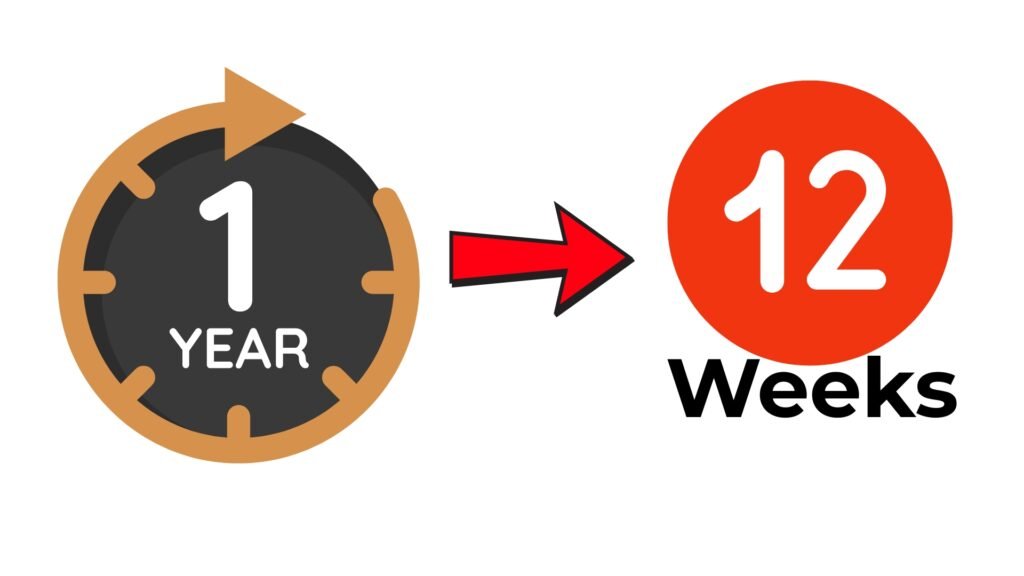
Sept. 27th, 2025


Written by Dan Mintz, a leading productivity strategist, expert in the 12 week year, and the founder of the 12-Week Breakthrough Program. Wharton MBA, MIT Data Scientist, 3x Entrepreneur.
Worked with dozens of people to transform their lives in 12 weeks.
Every January, millions of people set annual goals—only to abandon them by February. Gym memberships spike, planners sell out, and motivation feels high. Yet by summer, those resolutions are forgotten. Why?
Because 12 months is too long. A year invites procrastination. It tricks you into believing there’s always more time to act. You delay, drift, and by December, you’re left with disappointment.
The 12 Week Year flips this model. Instead of stretching goals across 12 months, it compresses everything into a 12-week execution cycle. Short enough to feel urgent. Long enough to accomplish something meaningful.
This shift isn’t just a productivity trick. It’s rooted in psychology, execution research, and human motivation.
This article is part of the 12-Week Year system. If you want the complete framework and how all components fit together, see The 12-Week Year: The Ultimate Guide.
The 12 Week Year, created by Brian Moran and Michael Lennington, is an execution framework that treats 12 weeks like a full year.
Instead of thinking annually, you work in four 12-week “years.” Each cycle includes:
The genius isn’t in complexity—it’s in compression. The 12-week window forces clarity, urgency, and consistency.
Annual planning sounds rational, but it fails for predictable reasons:
Twelve months creates comfort. Twelve weeks creates urgency.
Why not four weeks? Or six months? Why is 12 weeks the “magic” unit?
Research supports this:
Twelve weeks strikes the balance: urgency without burnout.

Here’s how one cycle unfolds:
The result? Instead of one “New Year” filled with guilt, you get four fresh starts every year.
It doesn’t just change how much you achieve. It changes how you see yourself—someone who sets goals and consistently executes.
It’s a system where you treat 12 weeks as a full year—setting goals, executing, measuring, and resetting every cycle.
Because a year is too long. Annual plans breed procrastination, vague goals, and delayed feedback. By the time you review, you’re off track.
12 weeks compresses time. Every week matters, urgency rises, and progress becomes visible. You achieve more in less time.
Quarterly planning still ties back to annual goals. The 12 Week Year treats each 12-week block as a full year—complete with vision, execution, scorekeeping, and reset.
Yes—by breaking them into milestones. Writing a book becomes 3 chapters. Launching a business becomes 1 MVP. Twelve weeks builds momentum without overwhelm.
With only 12 weeks, “later” doesn’t exist. The short horizon creates urgency, and weekly accountability keeps you moving.
Absolutely. People use it for fitness, learning, finances, relationships—any area where consistency beats intention.
It’s a built-in reset. You reflect on results, extract lessons, and start the next cycle. Four “new years” each year means fresh energy every quarter.
OKRs and GTD manage tasks and priorities. The 12 Week Year is about time compression—creating urgency by shrinking the planning horizon. They can work together.
One to three. More dilutes focus. The power of 12 weeks comes from concentration, not clutter.
Don’t try to “catch up” by overloading. Simply return to your cadence. Consistency beats intensity.
Yes. Teams can set shared 12-week goals, hold weekly accountability meetings, and measure progress with scorecards.
Yes. Resolutions fade because they lack urgency and structure. The 12 Week Year gives both—and resets every 12 weeks.
Not at all. Twelve weeks isn’t about “finishing” everything; it’s about creating meaningful momentum. Four cycles a year compound into transformation.
Use lead indicators (actions you control) instead of just lag indicators (results). For example: workouts completed, drafts written, calls made.
Yes—if you stay focused. Choose one primary goal (work or personal) with one supporting goal. Add a few maintenance habits like workouts or journaling.
Trust. You stop living in “someday mode.” You start setting goals, executing consistently, and seeing results within weeks—not years.
Annual goals create comfort. Twelve-week goals create urgency.
The 12 Week Year doesn’t just change what you achieve—it changes how you see yourself. Someone who executes. Someone who delivers.
Don’t wait until next January. Pick one meaningful goal, commit to 12 weeks, track your actions, and reset at week 13.
Freedom isn’t found in waiting. It’s built 12 weeks at a time.

Dan Mintz is the creator of the 12 Week Breakthrough Program. He advised dozens of individuals on how to achieve their most ambitious goals and reach their full potential.
Dan can be reached at:
dan.mintz@12week-breakthrough.com
About Dan Mintz
Additional Links:
Join the Program
Our Blog Page
https://12week-breakthrough.com/12-week-system-vs-productivity-hacks/
12 Week Year Implementation Guide 2026
Getting Things Done vs the 12 Week Year
Ahcieve Your Most Ambitious Goals with the 12-Week Year
Why 12 Weeks vs 12 Months?